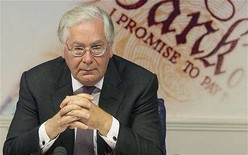BoE expects headline inflation to run above target till mid 2013
The Bank of England Wednesday admitted the headline inflation rate would run above target for another 'year or so', reversing the optimistic forecast in February that it would come down to desired level of 2 per cent by yearend.

"At 3.5 per cent in March, CPI (consumer prices index) inflation remains well above the 2 per cent target" forcing the bank to change the forecast, Governor Sir Mervyn King said presenting the quarterly inflation report.
"Inflation has fallen back sharply from its peak in September last year but remains well above the 2 per cent target, and is more likely than not to be above target until the middle of next year," the governor said.
By the end of the year, inflation is expected to be around 2.5 per cent, lowering to 2 per cent by mid 2013 and to fall below target to 1.6 per cent in two years' time.
The BoE's nine member Monetary Policy Committee (MPC)judges the near-term outlook for inflation to be higher than in February, in part because of higher energy prices and indirect taxes, and in part because cost pressures from past rises in global commodity prices and weak productivity appear likely to have a greater impact on inflation over the next year than had been expected.
But underlying domestic inflationary pressure is likely to remain muted as slack in the labour market continues to restrain wages. "As a result, inflation is likely to fall back to around the target in the second half of the forecast period," the report states.
On the economic front, Sir Mervyn said the output in the United Kingdom has been broadly flat for a year and a half. It remains more than 4 per cent below its level at the start of 2008.
"We are navigating through turbulent waters, with the risk of a storm heading our way from the Continent. We don't know when the storm clouds will move away," Sir Mervyn said.
Over the past year or so, two major factors have hampered the economic recovery and easing of inflationary pressures. This included the higher-than-expected world commodity and energy prices have squeezed real take-home pay, dampening consumption growth. Secondly, the credit conditions, far from easing, have in some cases become tighter.
The direct and indirect exposures of UK banks to the euro-area periphery have affected funding costs as the challenges of tackling the indebtedness and lack of competitiveness in those countries have intensified, the BoE report states.
Given the persisting challenges, the MPC has lowered its forecast for GDP growth to 0.8 per cent this year, compared to a previous estimate of 1.2 per cent.
Warning that the economy will not return to pre-financial crisis levels before 2014, Sir Mervyn said, "The economy will continue to face strong headwinds over the forecast period. Underlying concerns about balance sheets, especially in the financial sector with its exposure to the euro area, mean that the path of recovery is likely to be slow and uncertain."
In fact, the BoE says biggest risk to recovery stems from the single currency bloc, the UK's main trading partner.
GDP is expected to grow around 2 per cent in 2013, compared with the Bank's previous estimate of around 3 per cent.
Source: Europe News.Net
- 484 reads




